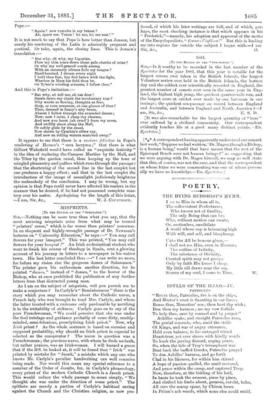MISPRINTS.
[To THE EDITOR OF THE " SPEETATOR."] SIR,—Nothing can be more true than what you say, that the most amusing misprints arise from what may be termed " printers' sense," which is far worse than printers' nonsense. In an eloquent and highly-wrought passage of Dr. Newman's lectures on " University Education," he says :—" You may cull flowers for your banquet." This was printed, "You may cull flowers for your bouquet !" An Irish ecclesiastical student who went to finish his course of theology in Spain, sent a glowing account of his journey in letters to a newspaper in his native town. His last letter concluded thus :—" I can write no more, for before my vision rise the gorgeous domes of Salamanca." The printer gave his enthusiasm another direction, for he printed. " dames," instead of " domes, " to the horror of the Bishop, who at once prohibited the publication of any further letters from that distracted young man.
As I am on the subject of misprints, will you permit me to make a conjecture ? In Carlyle's " Reminiscences " there is the story which you may remember about the Catholic nurse, a French lady who was brought to tend Mrs. Carlyle, and whom the latter treated with a rudeness only pardonable by ascribing it to the irritability of sickness. Carlyle goes on to say of the poor Frenchwoman, " We could perceive that she was under the foul tutelage and guidance probably of some dirty, muddy- minded, semi-felonious, proselytising Irish priest." Now, why Irish priest ? As the whole sentence is based on surmise and supposed probability, why should an Irish priest in especial be selected as the conspirator ? The nurse in question was a Frenchwoman ; the previous nurse, with whom he finds no fault, but rather praises, was an Irishwoman. I will hazard a guess that if the MS. be looked at, it will be found that " Irish" was printed by mistake for "Jesuit," a mistake which any one who knows Mr. Carlyle's peculiar handwriting can well conceive being made. Nor would this mean any special reference to a member of the Order of Jesuits, for, in Carlyle's phraseology, every priest of the modern Catholic Church is a Jesuit priest. This would reduce the whole passage to mean simply, " We thought she was under the direction of some priest." The epithets are merely a portion of Carlyle's habitual raving against the Church and the Christian religion, as now pro. fessed, of which his later writings are full, and of which, per- haps, the most shocking instance is that which appears in his " Frederick,"—namely, his adoption and approval of the motto of the Encyclopaadists, " Ecrasez infd me !" But this is leading me into regions far outside the subject I began with.—I am






































 Previous page
Previous page